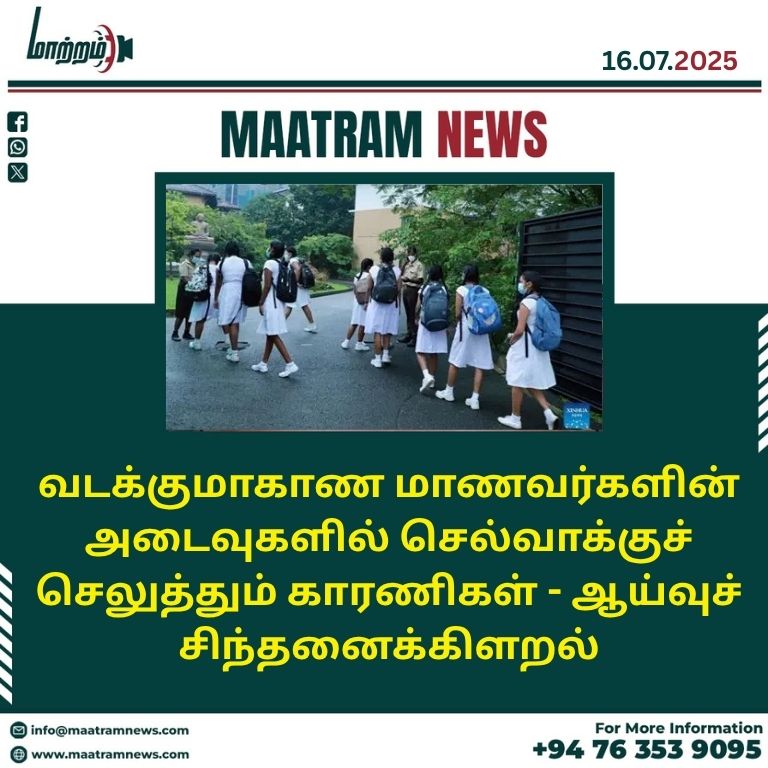
வடக்குமாகாண மாணவர்களின் அடைவுகளில் செல்வாக்குச் செலுத்தும் காரணிகள் – ஆய்வுச் சிந்தனைக்கிளறல்
உள்நாட்டு யுத்தத்திற்கு பின்னரான சூழலில், இலங்கையின் வடக்கு மாகாணத்தின் தரம் ஐந்து புலமைப்பரிசில்பரீட்சை மற்றும் க.பொ.த சாதாரணப்பரீட்சை பெறுபேறுகளை தேசியமட்ட பெறுபேறுகளுடனும், ஏனைய மாகாணங்களின் பெறுபேறுகளுடனும் ஒப்பிடும்போது வடமாகாணம் பின்தங்கிய நிலையில் உள்ளமையை புள்ளிவிபரங்கள் எடுத்துக்காட்டுகின்றன.
மாவட்டரீதியாகவும் மற்றும் கல்விவலயரீதியாகவும் நோக்குகின்றபோதும் வடக்கு மாகாணத்திலுள்ள மாவட்டங்கள் மற்றும் கல்விவலயங்கள் பின்தங்கியே இருக்கின்றன.
கடுமையான யுத்தம் நடைபெற்ற காலப்பகுதியில்கூட உயர்ந்த நிலையில் காணப்பட்ட வடமாகாணத்தின் பொதுக்கல்வி அடைவுகள் என்றுமில்லாதவாறு வீழ்ச்சிநிலையில் உள்ளமை தொடர்பான கவலையை கல்விச்சமூகத்தினர், கல்விசார் தொழிற்சங்கங்கள், அரசியல்வாதிகள், ஊடகங்கள், சமூகவலைத்தளங்கள், புலம்பெயர் தமிழர்கள், அரசசார்பற்ற நிறுவனங்கள் மற்றும் பொதுமக்கள் வெளியிட்டு வருகின்றனர்.
மாணவர்களின் அடைவில் பல்வேறு காரணிகள் ஒன்றிணைந்து கூட்டாகச் செல்வாக்குச் செலுத்துகின்றன.
மாணவர்கள் சார்பான காரணிகள்:
மாணவர்களிடம் சுயகற்றல் மற்றும் சுயமாக விளங்கிக்கற்கும் ஆற்றல் என்பன குறைவடைந்து செல்வதாகவும், சுயகற்றலில் ஈடுபடும் நேரம் போதாமல் உள்ளதாகவும் குறிப்பிடுகின்றனர். மாணவர்களிடத்தில் பரீட்சைமையக்கற்றலே அதிகமாக காணப்படுகின்றது.
மாணவர்களின் கற்றல் என்பது தற்காலத்தில், மனனம் செய்வதுடன் மட்டுப்படுத்தப்பட்டுவிட்டது. வாசிப்புபழக்கம் குறைவடைந்து செல்கின்றது.
மாணவர்களின் ஆசிரியர்கள் மற்றும் பெற்றோரை மதிக்கும்திறன் குறைவடைந்து செல்கின்றது. ஆசிரியர்களுக்கு கீழ்ப்படியாமை, பெற்றோரின் உழைப்பின்வலி தெரியாமை, இறைநம்பிக்கை குறைவு என்பன மாணவர்களின் கற்றல் அடைவு வீழ்ச்சியில் பங்களிப்புச்செய்கின்றன.
போதைப்பொருள் பாவனை, மதுப்பழக்கம், மற்றும் அதிகரித்த கைத்தொலைப்பேசிப்பாவனை, சமூகஊடகப் பாவனை என்பனவற்றால் அவர்களின் கற்றல் பாதிக்கப்படுகின்றது.
வெளிநாட்டுமோகம் மற்றும் டாம்பீகவாழ்க்கை (அகந்தையுடனான வாழ்க்கை முறை) நாட்டம் என்பன கற்றலில் மாணவர்களின் அக்கறையை குறைவடையச் செய்துள்ளன.
படிக்கக்கூடிய பிள்ளைகள் வறுமையினால் பாதிக்கப்படுகின்ற அதேவேளை, வேறுசிலமாணவர்களின் கல்வி அளவுக்கதிகமான வசதிவாய்ப்புக்களால் பாதிக்கப்படுகின்றது.
ஆசிரியர்கள் சார்பான காரணிகள்:
வடக்கு மாகாணத்தில் கல்வி வலயங்களிடையிலும் பாடசாலைகளுக்கு இடையிலும் ஆசிரியர்வளம் முறையாகப் பகிரப்படவில்லை.
நகர்ப்புறப்பாடசாலைகளில் மேலதிகமாக ஆசிரியர்கள் உள்ளபோதும் கிராமப்புறங்களில் பற்றாக்குறை நிலவுகின்றது.
தேசியபாடசாலைகள் மற்றும் மாகாணப்பாடசாலைகளுக்கு இடையில் ஆசிரியர் பரம்பலில் வேறுபாடு காணப்படுகின்றது.
அதேபோன்று வடக்கு மாகாணத்தில் ஆசிரியர் நியமனங்களிலும் குறைபாடு காணப்படுகின்றது. இலங்கையில், அதிகளவிலான தொண்டராசிரியர் நியமனங்கள் வடக்குமாகாணத்திலேயே வழங்கப்பட்டுள்ளன.
தொண்டராசிரியர்கள் பாடவிடயங்கள் மற்றும் கற்பித்தல் விடயங்கள் என்பனவற்றில் தேவையான தேர்ச்சிகளையும் திறன்களையும் கொண்டிருக்கவில்லை.
கல்வி அதிகாரிகள் மற்றும் பாடசாலை அதிபர்கள் சார்பான காரணிகள்:
கணிசமான கல்வி அதிகாரிகளும், பாடசாலை அதிபர்களும் நிர்வாகத்திறன் குறைந்தவர்களாக காணப்படுகின்றனர்.
பாடசாலைகள் முறையாகவும் கிரமமாகவும் மேற்பார்வை செய்யப்படுவதில்லை அல்லது மேற்பார்வையில் பலவீனமானநிலை காணப்படுகின்றது.
கீழ்மட்ட ஆலோசனைகளுக்கு முக்கியத்துவமளிக்கும்நிலை குறைவாககாணப்படுகின்றது.
அதிகாரிகள் தம்மைப் பாதுகாத்துக்கொள்ள ஆவணப்படுத்தலுக்கும் முகாமைத்துவச் சடங்குகளுக்கும் முக்கியத்துவம் வழங்குகிறார்கள் என ஆசிரியர்கள் குறிப்பிடுகின்றனர்.
‘தாம் சொல்வது மட்டுமே சரி’ என்ற அதிகாரமனப்பாங்கும் பழிவாங்கும், அவமானம் செய்யும் மனப்பாங்கும் அவர்களிடம் உள்ளதாக குறிப்பிடுகின்றனர்.
பெற்றோர் சார்பான காரணிகள்:
பிள்ளைகளை பொறுப்பாக வளர்க்கத் தெரியாத பெற்றோர்,
தென்னிந்திய சினிமா மற்றும் தொலைக்காட்சி தொடர் நாடகங்களுக்கு பெற்றோர் அடிமையாக இருத்தல்,
கிராமப்புற பெற்றோரின் கல்விசார் அக்கறை தாழ்வாக காணப்படுதல்,
வீடுகளில் பிள்ளைகள் கற்பதற்கான உகந்த சூழல் காணப்படாமை,
பெற்றோரின் அங்கலாய்ப்பு மற்றும் ஐந்தாம் தரத்தின் பின்னர், பிள்ளைகளின் கல்வி தொடர்பாக பெற்றோரின் ஈடுபாடு குறைதல் என்பன பிள்ளைகளின் அடைவு வீழ்ச்சிக்கு காரணமாகின்றது.
ஏனைய காரணிகள்:
கடந்தகால யுத்தசூழல் காரணமாக மூளைசாலிகள் வெளியேற்றம்,
சமூக அசைவு,
குறுக்கு வழியில் இலாபமீட்ட முயலும் வியாபார நடவடிக்கைகள்,
புலம்பெயர் உறவுகளின் நிதிப்பாய்ச்சல்,
சமூக பொருளாதார பிரச்சனைகள்,
தனியார் கல்வி நிறுவனங்களின் அறமற்ற செயற்பாடுகள் மற்றும் பரீட்சை முறையில் உள்ள குறைபாடுகள் என்பனவும் மாணவர்களின் அடைவு வீழ்ச்சிக்கு காரணமாகின்றது.
இலங்கையின் 25 மாவட்டங்களினதும் வறுமை சுட்டெண்ணையும் க.பொ.த சாதாரணதரப்பரீட்சை சித்திவீதத்தையும் ஒப்பிட்டு நோக்கும்போது, வடக்கு மற்றும் கிழக்கு மாணங்களிலுள்ள மாவட்டங்களிலும் நுவரேலியா மாவட்டத்திலும் நேரடித் தொடர்பு காணப்படுகின்றது.
📍 பொதுப்பரீட்சைகளில் மாணவர்களின் அடைவுகளை மேம்படுத்துவதற்கான சிபார்சுகள்:
பெற்றோர்கள் பிள்ளைகளில் அதிக கவனம் எடுக்க வேண்டும்.
- பாடசாலை அதிபரை ஆசிரியர்கள் ஏற்றுக்கொள்ள வேண்டும்.
வலயக் கல்விப்பணிப்பாளரை அதிபர்கள் மற்றும் ஆசிரியர்கள் மற்றும் ஏனைய உத்தியோகத்தர்கள் அங்கீகரிக்க வேண்டும். - ஆசிரியர்வளம் பகிரப்பட வேண்டும், பாரபட்டசம் நீக்கப்பட வேண்டும், விட்டுக்கொடுப்புக்கள் வேண்டும், அர்ப்பணிப்பு வேண்டும்.
- ஆசிரியர்களுக்கு எழுத்துமூல பழுவைக்குறைத்து வகுப்பறை கற்பித்தலை ஊக்கப்படுத்த வேண்டும்.
- ஆசிரியர்கள், போட்டி பொறாமைத் தன்மையை தவிர்த்து கற்பிக்க முன்வர வேண்டும்.
- பாடசாலைமட்ட செயற்றிட்டங்களுக்கு முக்கியத்துவமளித்தல் வேண்டும்.
தமது பாடசாலைப் பிள்ளைகளின் பிரச்சனைகளை இனங்கண்டு அதற்கான செயற்றிட்டங்களை நடைமுறைப்படுத்த வேண்டும். - பாடசாலை அதிபர்கள், தமது பாடசாலை மாணவர்களின் கல்விக்கு முக்கியத்துவம் கொடுப்பவர்களாகவும் வாண்மையாளர்களாகவும் தம்மை மாற்றக்கூடியவர்களாகவும் காணப்பட வேண்டும். ஆசிரியர்களை இலக்கை நோக்கி அணியாக வழிநடத்த வேண்டும்.
- குறைவான பெறுபேறுகளை பெற்ற பாடசாலைகள், தம்மை சுயபரிசோதனைக்கு உட்படுத்த வேண்டும்.
- புதவிநிலை உத்தியோகத்தர்கள், தாம் சொல்வது மட்டுமே சரி என்னும் மனப்பாங்கையும் எம்மால் முன்னெடுக்கப்படும் செயற்றிட்டங்களை ஆசிரியர்கள் நடைமுறைப்படுத்த வேண்டும் என்ற அதிகார மனப்பாங்கை தவிர்த்து, ஒவ்வொரு கல்விசார் நடவடிக்கைகளிலும் முதன்மை பங்காளர்களாக ஆசிரியர்களை உள்வாங்க வேண்டும்.
- புத்தாக்க மற்றும் பரஸ்பர கல்வி முறைமைகள் புகுத்தப்பட்டு செயற்படுத்தப்பட வேண்டும். கூட்டு முயற்சி அவசியம்.
- பொதுப்பரீட்சைகளில் கல்வி அடைவுகளை மேம்படுத்த மேலதிக உதவி மற்றும் ஆதரவு தேவைப்படும் பாடசாலைகளை கண்டறிந்து, அவற்றை முன்னேற்றுவதற்கு கொள்கை வகுப்பாளர்கள் மற்றும் கல்விப் பங்குதாரர்கள் அவர்களின் பூரண பங்களிப்பை வழங்க வேண்டும்.
கலாநிதி ஆ.நித்திலவர்ணன்
கல்வியியல் துறை,
உயர்பட்டப்பபடிப்புக்கள் பீடம்,
யாழ்ப்பாணப் பல்கலைக்கழகம்
மேலதிக செய்திகளுக்கு மாற்றம் செய்திகள்
Factors Influencing the Academic Achievement of Northern Province Students – A Thought-Provoking Analysis
In the post-war context of the domestic conflict, statistical data reveals that the Northern Province of Sri Lanka has fallen behind when comparing the Grade 5 Scholarship Examination (G. P. Th.) and the General Certificate of Education Ordinary Level (G.C.E. O/L) results—both nationally and against other provinces.
Whether analyzed by district or education zone, districts and zones in the Northern Province lag behind.
Despite once performing well during the war period, the province’s general education achievements have declined sharply—a matter of serious concern expressed by the education community, teachers’ unions, politicians, media, social media, Sri Lankan Tamils abroad, NGOs, and the public.
Multiple factors contribute collectively to students’ declining performance:
✏️ Student‑Related Factors:
- Low ability for self‑learning and independent thinking, with insufficient time spent on self-study. Instead, exams‑driven rote learning prevails.
- Limited deep thinking and reflection, and declining reading habits.
- Reduced respect for teachers and parents, leading to disobedience, unrecognized parental effort, and poor religious grounding—factors harming learning.
- Substance abuse, alcohol consumption, heavy mobile phone and social media use affect learning negatively.
- Desire for foreign lifestyles and “tāmpīkavāḻkkai” (arrogant lifestyles) have dampened students’ academic motivation.
- Children from poor families are disadvantaged, while some benefit unfairly from better facilities.
👩🏫 Teacher‑Related Factors:
- Unequal distribution of teachers across education zones and schools. Urban schools are overstaffed; rural schools are short.
- Discrepancies between national and provincial schools in teacher staffing.
- A shortage of official teachers in the Northern Province—many “visiting” or temporary teachers (thondarācariyars) have been employed.
- These visiting teachers often lack proper qualifications and teaching skills.
👨💼 Education Officials & Principals:
- Many education officials and school principals lack administrative capacity.
- Schools are either poorly managed or rarely monitored.
- There is weak follow‑through on guidance and oversight.
- Officials emphasize paperwork and bureaucratic appearances, say teachers.
- A top-down “my word is law” attitude, coupled with vindictiveness and humiliating behaviour, has been reported.
👪 Parent‑Related Factors:
- Parents lack the ability to raise children responsibly.
- Some parents are obsessively influenced by South Indian cinema and TV serials.
- Rural parents show low concern for education, and homes lack a conducive learning environment.
- Parental indifference after the Fifth grade leads to decreased involvement in children’s education.
🌍 Other Contributing Factors:
- Brain drain due to past war displacement,
- Social unrest,
- Illicit for-profit businesses,
- Financial outflows to diaspora,
- Socioeconomic hardships,
- Unethical private education providers and flawed examination systems.
Data comparing poverty indices and O/L pass rates across Sri Lanka’s 25 districts shows a direct correlation in the Northern and Eastern districts, as well as in Nuwara Eliya.
📍 Recommendations to Improve Exam Outcomes:
- Parents must provide greater attention to their children’s education.
- Teachers should respect and support their principals.
- Education zone officers, principals, teachers, and staff should formally recognize and cooperate together.
- Equitable distribution of staff, elimination of “favoritism,” and provision of incentives and dedication for teachers.
- Encourage innovative teaching methods rather than rote instruction.
- Teachers must instruct without envy, competitiveness, or malice.
- Prioritize school-level action projects and address student-specific problems effectively.
- Principals should serve as visionary leaders, guiding teachers toward shared goals.
- Schools with poor performance must undergo self-evaluation.
- Officials and principals should abandon authoritarian mindsets and genuinely include teachers in educational initiatives.
- Introduce collaborative learning approaches and peer-support systems. Collective effort is essential.
- Identify schools requiring extra support to enhance exam achievement, and ensure policy-makers and educational stakeholders provide full assistance.
For more information, change the news.
Prepared by:
Kalaṉidhi A. Niththilavarnan
Department of Education,
Faculty of Postgraduate Studies,
University of Jaffna



